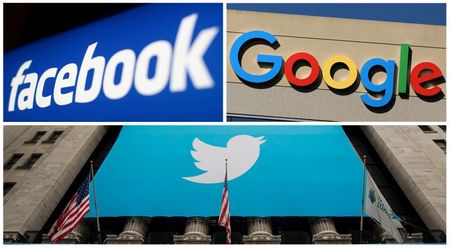Big tech may be forced to pay for UK journalism as Dorries pushes new laws

Tech giants may be forced to pay British newspapers for their stories as Westminster draws up new plans to clamp down on the likes of Google and Meta.
The move has been instigated amid growing concerns that tech firms are dominating online advertising, to the detriment of consumers and businesses.
Currently US firms cash in on millions of clicks driven by news organisations, and new rules could mean Silicon Valley giants will start paying for journalism.
Google and Facebook took about four-fifths of the £14bn spent on digital advertising in the UK in 2019, while national and local newspapers took less than four per cent. Google charges between 30 and 40 per cent more for search advertising on desktop and mobile devices than Bing, its closest rival.
It comes after Australia passed its world-first law, which demands that social media giants start paying for news content on their platforms.
Culture Secretary Nadine Dorries is thought to the pioneer of this legislative push.
Any new regime would be regulated by the Digital Markets Unit (DMU), a digital watchdog that was set up within the Competition and Markets Authority (CMA) to rein in the power of the tech platforms. This body would also set a fair price for the news.
A source in the Department for Digital, Culture, Media and Sport told The Mail On Sunday that the planned regime was ‘pro-competition’ and ‘supports the sustainability of the press’.
The source told the paper: “The new regime will be an important vehicle to tackle the imbalance of power between the largest platforms and publishers.”
“The measures would give publishers greater transparency over the algorithms that drive traffic and revenue, more control over the presentation and branding of their content, as well as greater access to data on how users interact with their content.”
The source added the plans would “help to redress the imbalance of bargaining power in determining fair payment for content”.
Responding to the report from The Mail On Sunday , News Media Association chief executive Owen Meredith said: “The NMA has consistently called for urgent legislation to put the Digital Markets Unit on a statutory footing.
“We welcome reports that work on this legislation is underway and will include a requirement for platforms to pay publishers for their content.
“For too long the tech platforms have been able to abuse their dominant position to leech advertising revenues away from the publishers who invest in news content while contributing next to nothing back into the sector.
“It is vital that the new regime brings this unfair and unsustainable imbalance of power to an end once and for all, ensuring consumers have access to trusted sources of news and information online.”
Matt Navarra, social media consultant, is critical of the potential reform, and called the potential move “grossly inappropriate”. He told City A.M.: “It is not the right solution for a complex problem.”
In his view, a lot of news outlets actually benefit from social media, with the likes of Facebook and Twitter actually driving traffic to their sites.
“It seems to be becoming too easy to lay all our problems at the door of big tech. They are responsible for a lot of things. But to suggest this issue is their responsibility, I’m not too sure”, Navarra said.
Instead, he suggested that the government should either tax tech firms more, or offer subsidies to the news industry to “prop up quality journalism”. Navarra said that the “quasi middle ground” suggested by Dorries could lead to unintended consequences.
This is echoed by Matthew Lesh, Head of Public Policy at the Institute of Economic Affairs, who told City A.M.: “It’s absurd to suggest that news companies are entitled to cash from their competitors. It would be like arguing that the horse and buggy operators should have been compensated by the motor vehicle industry.”
“News media are not magically entitled to advertising revenue or consumer cash, they need to provide a product that people want like any other business. Consumers and businesses have hugely benefited from lower cost, targeted advertising provided by Google and Meta.”
“It’s also bizarre to add this to the remit of the yet-to-be formally established Digital Market Units. The DMU seems to be taking on the bizarre role as an all-knowing regulator of almost everything.”